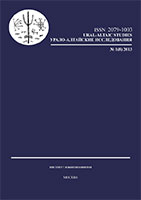О системе наклонений глагола в монгольских и тюркских языках
Grammatical mood in the Mongolian and Turkic languages
Author(s): Valentin I. RassadinSubject(s): Language and Literature Studies, Theoretical Linguistics, Morphology, Lexis, Semantics, Historical Linguistics
Published by: Институт языкознания Российской академии наук
Keywords: the Mongolian languages; the Old Turkic language; the Turkic languages; system of grammatical moods; typological similarity
Summary/Abstract: In the article the author has a view that grammatical mood is a grammatical category expressing the way actions refer to the reality and proves that a language reflects the reality with its forms of grammatical moods. The article proves existence of the system in the Mongolian languages that consists of four independent moods ― temporal, modal, adverbial and irreal, each including forms that correspond to tense, modality and person. A comparison with the system of grammatical moods in Old Turkic reveals the typological similarity and absence of material base that proves their independent formation.
Journal: Урало-алтайские исследования
- Issue Year: 2013
- Issue No: 01 (8)
- Page Range: 127-138
- Page Count: 12
- Language: Russian

